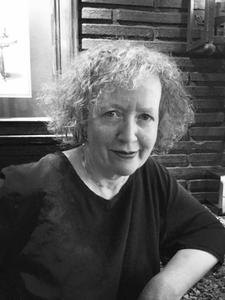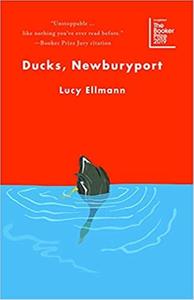
|
|
| photo: Todd McEwen | |
Lucy Ellmann's first novel, Sweet Desserts, won the Guardian Fiction Prize. Her seventh is Ducks, Newburyport (Biblioasis), shortlisted for the Man Booker Prize and called "a wildly ambitious and righteously angry portrait of contemporary America" by the Observer.
On your nightstand now:
I have not read enough Céline or Woolf, and intend to read more toot sweet: Louis-Ferdinand Céline's Journey to the End of the Night and Virginia Woolf's Mrs Dalloway and To the Lighthouse.
I'm also looking forward to Caradoc Evans's Fury Never Leaves Us, recommended to me by my husband [the writer Todd McEwen]. He also thinks I'd like Tayeb Salih's Season of Migration to the North (timely title) and Quesadillas by Juan Pablo Villalobos. Todd's tips are a great help.
Then there's Don Quixote (the J.M. Cohen translation). This is not even near my nightstand. I had to leave my copy behind in Spain. But I'm returning to Spain this year, and to the promised weirdness of Quixote part two.
Favorite books when you were a child:
Jean de Brunhoff's Babar books, particularly The Story of Babar, about his brief and violently truncated childhood (pun intentional); Babar and Father Christmas, for the amiable mice in the attic; and Babar at Home, when Babar and Celeste start procreating.
The Madeline books by Ludwig Bemelmans. Especially Madeline and the Gypsies, in which she and Pepito have to dress up as a lion and perform in the circus. You feel for them, but also for the lion, who always looks miserable. Once she knows what's going on, Miss Clavel rushes fast and faster to the scene of the disaster.
Maurice Sendak's The Nutshell Library is essential reading with a flashlight under the covers when you're young. Owning this many tiny precious books makes you feel like a king!
And Edward Ardizzone's Tim books are kindliness personified. He's so humane and very good at drawing plump women.
A Candle in Her Room by Ruth M. Arthur. This was my first taste of a multiple-voice narrative, and I thought it incredibly sophisticated. Moving, too.
Your top six authors:
1. Jane Austen. In vain have I struggled to find anything better than this genius.
2. Thomas Bernhard. To be read seated in a wing chair.
3. Molly Keane. Particularly Good Behaviour, about a sad-sack, malcontented, ne'er-do-well daughter, with whom it's all too easy to identify.
4. Elfriede Jelinek, for her savage play with words and exhilarating contempt for Austria.
5. Charles Dickens. "Chapter 1: I AM BORN". Damn him, he took all the best lines.
6. The fiercely defiant Thomas Hardy.
Book you've faked reading:
I. Kant. I can't. Fortunately, it's impossible for anybody to tell if you've read him or not.
 Books you're an evangelist for:
Books you're an evangelist for:
The Language of the Goddess by Marija Gimbutas. Through careful archeological research, Gimbutas documented the presence throughout the world of matriarchal societies respectful of women and attuned to nature.
The Wise Wound by Penelope Shuttle and Peter Redgrove. An artistically exploratory book on that unmentionable subject, menstruation. Not a curse, it turns out, but a privilege.
The Story of V by Catherine Blackledge. Vaginas rule the world.
S.C.U.M. Manifesto by Valerie Solanas. The philosophy and writing style may be questionable, the vivacity is not.
The Country of the Pointed Firs by Sarah Orne Jewett. An odd little impressionistic account of rural life in Maine, with references to witchcraft, or at least herbalism, and hints of matriarchy.
These books are my arsenal in the crusade for female supremacy, or the "Odalisque Revolution," as outlined in my last novel, Mimi.
Book you bought for the cover:
Sushi for Parties by Ken Kawasumi. My sushi skills barely stretch to figuring out how to make the vinegar rice, but I can look at the pictures: little white glossy rabbits made out of squid; a roundel displaying the 2-D form of a floating chrysanthemum; an egg and seaweed roll that looks just like a diploma.
Book you hid from your parents:
My parents were highly literary, so no books were banned. I may have read Moll Flanders secretly, but it was their copy! I think my father handed me Frank Harris's My Life and Loves himself, so there was no hiding that one, either.
Books that changed your life:
King Lear by William Shakespeare. The writing's better and better, the madder Lear gets.
The Life and Opinions of Tristram Shandy, Gentleman, by Laurence Sterne. The playfulness. The squiggles, the black page, the opening chapter with its risqué conception scene. Adulthood's not so bad, once you know about Sterne.
And The Palm-Wine Drinkard by Amos Tutuola, magic realism at its zaniest.
Favorite line from a book:
"My very photogenic mother died in a freak accident (picnic, lightning) when I was three..." from Vladimir Nabokov's Lolita.
Five books you'll never part with:
1. Pride and Prejudice by Jane Austen.
2. Thinking About Women by my mother, Mary Ellmann.
3. James Joyce by my father, Richard Ellmann.
4. Who Sleeps with Katz by my husband, Todd McEwen.
5. Birds' Eggs, compiled by G. Evans (Observer Book series, 1960). You can never see too many birds' eggs.
Books you most want to read again for the first time:
I first encountered Cutting Timber/Woodcutters by Thomas Bernhard by chance, when I was asked to review it. Bernhard changed the direction of the novel. Salinger's The Catcher in the Rye was a great find, too.
Books I wish I hadn't read:
My parents owned a book on childhood diseases, with pictures. It scared the shit out of me.
I had to read White Fang by Jack London as a kid, for school. Maybe I was too young. It seemed sadistic to me and, unforgivably, the animal dies at the end. This was the only book I ever burnt. I don't think you should burn books.
I read some drugstore paperback about the Boston Strangler once, and that's the only book I ever threw in the trash. I don't think you should throw books in the trash.
The Black Tulip by Alexandre Dumas (père) began so well, I'd already recommended it to someone else before the thing went rapidly downhill. Too much prison; not enough tulips.
I did not like The Breast at all, at the age of 16, and wrote to Philip Roth to complain. No reply.
I regret reading all the detective books I ever tried except Raymond Chandler; and all sci-fi except Stanislaw Lem's The Star Diaries. His creation myth in the 20th voyage beats all. Most sci-fi writers are just too stuck on humanoids. There must be something better out there.

